Alfa Romeo 155
The Alfa Romeo 155 (Type 167) is a compact executive car produced by Italian automobile manufacturer Alfa Romeo between 1992 and 1997. It was unveiled in January 1992 at Barcelona, with the first public launch in March 1992, at the Geneva Motor Show. A total of 192,618 units were made before it was replaced by the 156.
| Alfa Romeo 155 | |
|---|---|
.jpg.webp) Alfa Romeo 155 Q4 | |
| Overview | |
| Manufacturer | Alfa Romeo |
| Production | 1992–1998 |
| Assembly | Italy: Pomigliano d'Arco plant, Campania[1] |
| Designer | Ercole Spada at I.DE.A Institute[2] |
| Body and chassis | |
| Class | Compact executive car (D) |
| Body style | 4-door saloon |
| Layout | Front-engine, front-wheel-drive / four-wheel-drive |
| Platform | Type Three platform (Tipo Tre)[3] |
| Related | |
| Powertrain | |
| Engine | |
| Dimensions | |
| Wheelbase | 2,540 mm (100.0 in) |
| Length | 4,443 mm (174.9 in) |
| Width | 1,700–1,730 mm (66.9–68.1 in) |
| Height | 1,440 mm (56.7 in) |
| Curb weight | 1,195–1,430 kg (2,635–3,153 lb) |
| Chronology | |
| Predecessor | Alfa Romeo 75 |
| Successor | Alfa Romeo 156 |
Design
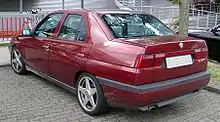
Developed to replace the 75 and based on the parent company Fiat Group's Type Three platform, the 155 was somewhat larger in dimension than the 75 and had evolved styling from that of its predecessor. The 155 was designed by Italian design house I.DE.A Institute. An exceptional drag coefficient of 0.29 was achieved with the body design. The boxy design of the 155 allowed for a big boot space 525 L (115 imp gal; 139 US gal).[4]
The most significant technical change from the 75 was the switch to a front-wheel drive layout. A four-wheel-drive model called the 155 Q4 was also available, which had a 2.0-litre (120 in3) turbocharged engine and a permanent four-wheel drive powertrain, both derived from the Lancia Delta Integrale; it was essentially a Lancia Delta Integrale with a different body.[5]
The new model came in "Sport" and "Super" trims. The Sport had a slightly lowered ride height and more aggressive dampers while the Super had the option of wooden trim and electronically controlled dampers and seat controls.
Reception of the 155 was generally lukewarm. The 75 had been conceived prior to Fiat's acquisition of the Alfa brand, so as the last independent Alfa romeo automobile made it cast rather a shadow over the 155; the loss of rear-wheel drive was frequently cited as the main cause of the disappointment.[6][7] Nevertheless, the 155 was entered in Touring Car racing and was successful in every major championship it entered, which gradually improved its image.
The 155 received a facelift in 1995 and changes included a wider body as well as a wider track and revised steering based on Alfa Romeo's racing experience. The facelift also brought in new 16 valve engines for the 1.8 and 2.0 litre models, whilst retaining the 2.5 litre V6 and making some improvements to cabin materials and build quality.
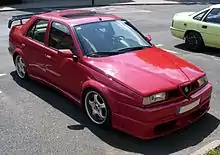
There were several Sport Packs available, including a race inspired body kit (spoiler and side skirts) and black or graphite coloured 16 inch Speedline wheels. The luxury oriented Super trim came with wood inserts in the cabin and silver-painted alloy wheels.
The 155 was never produced in the Sportwagon bodystyle (Alfa Romeo's term for an estate or station wagon), but Sbarro made a proposal for such a model in 1994 which was not put into production.[8]
Production of the 155 ceased in 1998, when it was replaced by the 156, which was a further development in terms of quality and refinement, and finally moved away from the wedge styling — leaving the 155 as the pinnacle of that particular design stream which dated back to 1977, with the dramatic square styling of the Giulietta Nuova.
Timeline
- 1992 – 155 launched
- 1993 – Grill design changed from “flushed” to “recessed”
- 1994 – 155 Silverstone introduced to the British market, 155 Q4 and turbodiesels to some markets
- 1995 – New "widebody" series 2 155 launched with wider track and quick rack steering wheel, initially only available with 2.0 L 16v engine
- 1996 – Widebody with 1.8 L 16v engine introduced
- 1998 – Production ends
| Model | Units |
|---|---|
| 155 1.6 | 6,310 |
| 155 1.7 | 36,359 |
| 155 1.8 | 67,295 |
| 155 1.8 Silverstone/Formula | 2,500 |
| 155 1.8 8v Sport | 2,500 |
| 155 1.8 /1.6 16v Sport | 2,500 |
| 155 2.0 | 38,315 |
| 155 2.5 | 7,196 |
| 155 2.0 TD | 15,652 |
| 155 2.0 Q4 92/93 | 2,591 |
| 155 2.0 Q4 MY 95 | 110 |
| 155 2.5 TD | 11,290 |
| Total | 192,618 |
Specifications and special editions
The 155 was initially available with 1.7 L Twin Spark, 1.8 L Twin Spark, and 2.0 L Twin Spark petrol engines, the latter two were equipped with variable valve timing. The 1.7 L was not sold in the United Kingdom.
Two four cylinder turbocharged diesel engines, a Fiat derived 1.9 L (92 PS (68 kW; 91 hp)) and a VM Motori[10] 2.5 L (125 PS (92 kW; 123 hp)) were available in some markets, except for the United Kingdom.
At the top of the 155 range were the 2.5 L V6, using a 166 PS (122 kW; 164 hp) engine derived from the 3.0 L V6 used in the larger 164, and the Q4 which used a drivetrain derived from the Lancia Delta Integrale which meant a 190 PS (140 kW; 190 hp) 2.0 L 16V turbocharged engine and permanent four-wheel drive.
The Q4 also incorporated three differential gears (normal at the front, epicyclic at the centre (including a Ferguson viscous coupling) and torsen self-locking at the rear).[11] Both the 2.5 V6 and Q4 models were also available with electronically adjustable suspension with two damper settings (automatic and sport).

The most notable special edition was the "Silverstone" edition released in the United Kingdom which was known as the "Formula" in Europe: this was intended as a homologation exercise to allow Alfa Romeo to compete in the British Touring Car Championship race series and consequently came with a bolt on aero kit, consisting of an adjustable rear spoiler and extendable front air splitter.[12]
The Silverstone was a lighter but no more powerful version of the 1.8 L, even though the race car it was homologating had a 2.0 L engine. This anomaly came about because the 1.8 L engine block, with its narrower bore, allowed Alfa to use a longer stroke on the racing car and stay within the 2.0 L capacity limit.
The Silverstone was only available in either Alfa red or Black paintwork with plain, unpainted bumpers.
Facelift

.jpg.webp)
In 1995, the 155 was given an extensive revamp, resulting in wider front and rear tracks with subtle enlargement to the wheel arches to accommodate the changes underneath.[13]
The revised car also received a quicker steering rack, with 2.2 turns lock to lock (initially only on the 2.0 litre model, but later followed by the 1.8 litre). The four cylinder cars retained the twin spark ignition system but received the Alfa Romeo designed 16 valve cylinder heads with belt driven camshafts based on engine blocks of Fiat design. They replaced the elderly 8 valve, chain driven camshaft motors of the earlier models.
The 2.5 L V6 engine continued in wide body form (but without the steering changes) while the Q4 was discontinued. In Europe, the 1.7 L Twin Spark was replaced by a 1.6 L 16 valve Twin Spark. Some 8 valve engines continued in series 2 cars in some markets. The wide bodied cars also received revised interiors and equipment specifications to keep the cars competitive in the market.
The wide body ("Series 2") 155s can be distinguished from their earlier counterparts by their flared front and smooth rear wheel arches (the latter replacing the lip round the wheel arch of the original). They also sported round or oblong indicator side-repeaters and had their model badges moved below the rear lights rather than having them above.
Engines
| Model | Type | Displacement | Power | Torque | 0–100 km/h 0–62 mph |
Top speed | Note |
|---|---|---|---|---|---|---|---|
| Petrol engines | |||||||
| 1.7 8V | I4 | 1,749 cc (106.7 cu in) | 84 kW (115 PS) at 6,000 rpm | 146 N⋅m (108 lb⋅ft) at 3,500 rpm | 10.6 s | 191 km/h (119 mph) | |
| 1.8 8V | I4 | 1,773 cc (108.2 cu in) | 98 kW (129 PS) at 6,000 rpm | 165 N⋅m (122 lb⋅ft) at 5,000 rpm | 10.3 s | 200 km/h (124 mph) | |
| 2.0 8V | I4 | 1,995 cc (121.7 cu in) | 104 kW (143 PS) at 6,000 rpm | 187 N⋅m (138 lb⋅ft) at 5,000 rpm | 9.3 s | 205 km/h (127 mph) | |
| 2.5 V6 | V6 | 2,492 cc (152.1 cu in) | 120 kW (166 PS) at 5,800 rpm | 216 N⋅m (159 lb⋅ft) at 4,500 rpm | 8.4 s | 215 km/h (134 mph) | |
| Q4 | I4 | 1,995 cc (121.7 cu in) | 137 kW (190 PS) at 6,000 rpm | 291 N⋅m (215 lb⋅ft) at 2,500 rpm | 7.0 s | 225 km/h (140 mph) | |
| 1.6 16V | I4 | 1,598 cc (97.5 cu in) | 88 kW (120 PS) at 6,300 rpm | 144 N⋅m (106 lb⋅ft) at 4,500 rpm | 11.4 s | 195 km/h (121 mph) | since 1995 |
| 1.8 16V | I4 | 1,747 cc (106.6 cu in) | 103 kW (140 PS) at 6,300 rpm | 165 N⋅m (122 lb⋅ft) at 4,000 rpm | 10.0 s | 205 km/h (127 mph) | since 1995 |
| 2.0 16V | I4 | 1,970 cc (120 cu in) | 110 kW (150 PS) at 6,200 rpm | 187 N⋅m (138 lb⋅ft) at 4,000 rpm | 9.0 s | 210 km/h (130 mph) | since 1995 |
| Diesel engines | |||||||
| 2.0 TD | I4 | 1,929 cc (117.7 cu in) | 66 kW (90 PS) at 4,100 rpm | 186 N⋅m (137 lb⋅ft) at 2,500 rpm | 13.5 s | 180 km/h (112 mph) | |
| 2.5 TD | I4 | 2,500 cc (150 cu in) | 92 kW (125 PS) at 4,200 rpm | 294 N⋅m (217 lb⋅ft) at 2,000 rpm | 10.4 s | 195 km/h (121 mph) | |
155 GTA Stradale
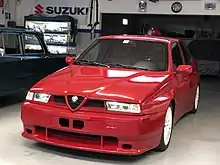
In 1992, Alfa Romeo on the wake of the wins obtained by the 155 GTA in the Italian CIVT championship, decided to start the production of a "Stradale" version to be manufactured at the Abarth workshop. The car was displayed at Bologna Motor Show and being used at Monza GP d'Italia as safety car.
Designed by Abarth engineer Sergio Limone, the Stradale used the 155 Q4 as a base using its drivetrain and four-wheel drive system. The interior was stripped of some creature comforts and the car was fitted with a race inspired body kit with a large rear spoiler. Only unit was made before the project was due to high manufacturing costs.[14][15]
155 TI.Z and GTAZ
| External image | |
|---|---|
Two special editions of the 155 were made by Zagato. In 1993, the 155 TI.Z was introduced,[16] followed by the 155 GTAZ in 1995.[17] Both models had more muscular looking exterior and increased power than the standard 155, the TI.Z had the 170 PS (125 kW; 168 hp) Twin Spark engine and GTAZ had the 155 Q4's turbocharged two litre engine now rated at 215 PS (158 kW; 212 hp). Both models were built only a limited amount and many of the cars were sent to Japan.[18]
Motorsport
The 155 was very successful in touring car racing, using the Supertouring-homologated GTA and the V6 TI for the DTM. Between 1992 and 1994, the 155 managed to take the Italian Superturismo Championship, the German DTM championship (both with Nicola Larini at the wheel), the Spanish Touring Car Championship (with Adrián Campos), and the British Touring Car Championship (with Gabriele Tarquini).
The 155 remained competitive until it was replaced with the 156, finishing third in the DTM (then known as the International Touring Car Championship, or ITC) in 1996 with Alessandro Nannini and winning the Spanish championship again in 1997 with Fabrizio Giovanardi. In 1993, Larini in an Alfa 155 placed second in the FIA Touring Car Challenge behind Paul Radisich in a Ford Mondeo. The 156 was to continue the high standard set by the 155, winning the European Touring Car Championship multiple times.
155 V6 TI
The Alfa Romeo 155 V6 TI was a FIA Class 1 touring car that Alfa Corse raced from 1993 to 1996 in the Deutsche Tourenwagen Meisterschaft and the subsequent International Touring Car Championship. A high revving 2.5 L 60° V6 engine was coupled to a four wheel drive system, rated at 426 PS (313 kW; 420 hp) at 11,500 rpm.
Alfa Corse entered two 155 V6 TIs for works drivers Alessandro Nannini and Nicola Larini; the 1993 season was dominated by Larini winning 11 of 22 races.[19]
In 1994, the rivals from Mercedes seemed to have the advantage, but Alfa did manage to win a further eleven races. A more consistent performance from the Germans gave them the title. Since the 1995 season, the team got new sponsorship livery from Martini Racing.
The 1996 version had a 2.5 L 90° V6 engine based loosely on the PRV engine[20][21] rated at 490 PS (360 kW; 483 hp) at 11,900 rpm. The car has a top speed of around 300 km/h (190 mph) and weighed 1,060 kilograms (2,340 lb).[22]
The Alfa 155 V6 TI has a record of 38 wins (plus 3 other non championship races). The victories were obtained by seven different drivers: 17 (+1) Nicola Larini, 13 (+1) Alessandro Nannini, 2 Stefano Modena, 2 (+1) Christian Danner, 2 Michael Bartels, 1 Kris Nissen and 1 Gabriele Tarquini.
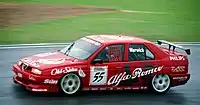 The 155 2.0 TS of Derek Warwick at Brands Hatch, 1995
The 155 2.0 TS of Derek Warwick at Brands Hatch, 1995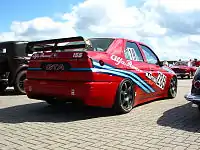 Rear view of Alfa Romeo 155 GTA
Rear view of Alfa Romeo 155 GTA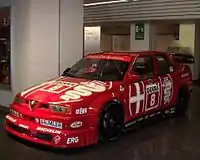 1993 DTM winner car, Nicola Larini's 155 V6 TI.
1993 DTM winner car, Nicola Larini's 155 V6 TI..jpg.webp) Alfa Romeo 155 V6 TI DTM 1996 in the National Automobile Museum of Turin
Alfa Romeo 155 V6 TI DTM 1996 in the National Automobile Museum of Turin
References
- "The Company". alfaromeo.com. Retrieved 4 August 2007.
- Chris Koopmann. "Ercole Spada". zagato-cars.com. Retrieved 24 May 2012.
- "Fiat Type platform". Fiat-tipo-portugal.com. Archived from the original on 18 June 2010. Retrieved 30 September 2010.
- "Technical specifications". daiblack.f2s.com. Retrieved 28 November 2010.
- Alfa Romeo 155 Q4 Test - Top Gear, retrieved 7 May 2020
- "Alfa Romeo 155 (1992 - 1998) used car review". www.rac.co.uk. Retrieved 7 May 2020.
- "1992 Alfa Romeo 155 | Hagerty – Classic Car Price Guide". www.hagertyinsurance.co.uk. Retrieved 7 May 2020.
- "Alfa Romeo 155 Sport Wagon". espera-sbarro.com.fr. Archived from the original on 17 September 2007. Retrieved 25 April 2007.
- "Production". alfa155club.nl. Retrieved 4 June 2012.
- "Alfa Romeo 155". vmmotori.it. Retrieved 28 October 2012.
- "New models". italiaspeed.com. Retrieved 25 April 2007.
- "SOTW: Alfa Romeo 155 Silverstone | PistonHeads". www.pistonheads.com. Retrieved 7 May 2020.
- "Alfa 155". www.alfaromeo.com. Retrieved 4 August 2007.
- "Why you need to buy this Alfa Romeo 155 GTA Stradale". Top Gear. 9 October 2018. Retrieved 7 May 2020.
- "The Alfa Romeo 155 GTA Stradale Was Italy's Answer To The BMW M3". CarBuzz. 11 October 2018. Retrieved 7 May 2020.
- "155Ti.Z". 246g.com. Retrieved 2 December 2009.
- "The List". zagato.it. Archived from the original on 13 July 2007. Retrieved 4 August 2007.
- "Alfa Romeo 155 Zagato". leblogauto.com (in French). Retrieved 4 August 2007.
- "Nicola Larini". driverdb.com. Archived from the original on 2 January 2008. Retrieved 1 January 2008.
- YouTube: Limone Racconta: La verità sul motore Alfa 155 V6 Ti + 156 e Fulvia Concept - Davide Cironi (SUBS) - YouTube, accessdate: 26. July 2018
- Collins, Peter (2012). Alfa Romeo 155/156/147 Competition Touring Cars. Dorset, England: Veloce Publishing. pp. 91–94. ISBN 978-1-845843-42-7.
- "Alfa Romeo 155 V6 TI". museoauto.it. Archived from the original on 3 June 2011. Retrieved 1 January 2008.